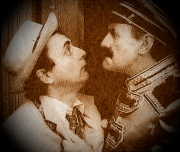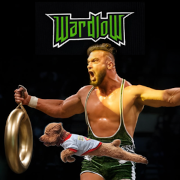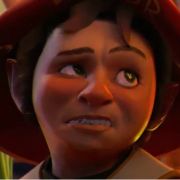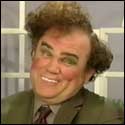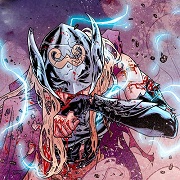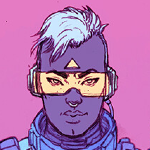|
Covok posted:This is going to sound odd, but how do I learn from a book? Get thee to the Literature Thread! But really, decent writing books dedicate a lot of time to teaching you how to take things apart - Francine Prose's Reading as a Writer and John Gardner's The Art of Fiction are mentioned in this thread, and I have a soft spot for Mario Vargas Llosa's Letters to a Young Novelist. But what any of them are going to tell you to do is to slow down. Pay attention to what's going on what you're reading. Go back to books you love, where you aren't wondering where it's going to to go, and take your time with them to really see what the writer is doing. How did they connect things together, and how did it work for you as a reader, the first time? And then go the opposite way! Read something totally new, in a different genre or from a different culture, where all you have is the text in front of you. No expectations or conventions - just what the author is presenting you, and see how things are revealed without the framework of familiarity.
|
|
|
|

|
| # ? May 10, 2024 21:04 |
|
Covok posted:This is going to sound odd, but how do I learn from a book? you have to read until you can look at sentences and understand how their grammar and punctuation and word choice come together to evoke that special feeling that makes you think "hmm this is quite good actually." I think learning to diagram sentences can help with this.
|
|
|
|
Critical reading is a good skill to develop, and you can work on it by pausing whenever you find a passage that hits you particularly hard, or even just a sentence, and then reading it over carefully and trying to test out why it works. What word choice did they use? How is the sentence structured? Do you see any rhymes or repeated sounds? Can you feel some kind of rhythm to the sentence? Did they use an odd or clever way of describing something? This works more broadly, too. If you're enjoying a character, stop and try to think about why this character is appealing. You might not be great at it at first, and that's fine--but the more you stop and consider, the more you'll build up a bank of examples to draw from in your head, and you'll start making connections and getting a better sense of how the authors you're reading have created effective prose.
|
|
|
|
I highlight or underline passages/lines I really like and sometimes write them down. I don't really go back and look through them that often, but its always good to have on hand. As far as big things like plotting or character development or whatever getting some perspective on the craft from a book on writing like After The War suggested is a great idea. I read Stephen King's On Writing and Ursula Le Guin's Steering the Craft and am noticing little bits in books or stories I wouldn't have noticed before. Recognizing things that allowed the author to shift scenes in a thematic and cohesive way, bits of dialogue that are just plain exposition, but done well. It's probably possible to be more deliberate to really "learn," but I mainly schlocky poo poo for fun; usually not worth analyzing too deeply. But I've learned a lot and its helped me employ similar ideas in my own writing.
|
|
|
|
I type out passages from stories that strike me and then make notes about how it struck me, which I've mentioned before. I also read widely and pay particular attention to voice. I think voice is far more important (and difficult) to nail than plotting, which is why you can find tons of books on plot, but have to read a lot of fiction to study voice. Though LeGuin's Steering the Craft is one of the few writing books that tries to tackle voice, and does a pretty good job of nailing the basics. I find a great narrative voice lets the author get away with drat near anything. A story can meander all over the place if the writer is a great bullshitter. Prime examples for me are Mark Twain, Kurt Vonnegut, Rivka Galchen, and Marlon James. I don't care where their stories end up because I'm too busy enjoying the ride. One thing I do to help focus my stories and develop the voice (this is primarily in first person), is figure out who the narrator is telling the story to and why. Are they trying to impress, justify their actions, or just make someone laugh? During editing, it helps me figure out what to cut, because some poo poo is not important enough to tell, even if the story seemed to naturally flow that way in the first draft. I ask myself, "If the audience was right here, would they be rolling their eyes with boredom right now?" If yes, it has to go, and any Important Details will have to fit in elsewhere. Conversations will have to be compressed or cut. Because as important as dialogue can be, people will lose interest if you drivel on. I write way too much bullshit. I love letting my characters bullshit. So developing a specific drive for the narrative is how I cut down the bullshit and get to the point.
|
|
|
|
This is a really silly question, but I constantly have an issue where I'll have a very clear outline for a story, and if I start 50 pages in I have no problem writing forever, but actually structuring a solid opening chapter that establishes the setting and orients the reader inevitably becomes a long, frustrating slog. Is there anything I can do to specifically work on that area, or is this a case where I should just write 100 really bad openings and learn from each one?
|
|
|
|
Hmm. Maybe practice by writing vignettes or short stories? Set yourself a word count to tell an entire story, like 2500 words, and then you have to figure out how to shorten the intro enough that you can fit the whole story in, and still have an effective opener. Do this 50 times.
|
|
|
|
Oh hey, that's a great suggestion; thanks!
|
|
|
|
Omi no Kami posted:Oh hey, that's a great suggestion; thanks! If you want some practice with short stories, you could always swing by Thunderdome.
|
|
|
|
Incidentally, I've been doing a lot of writing for (video game) RPGs recently, and I find it interesting how fundamentally that requires you to restructure your opening act. In novels or short stories, you generally have a bit of latitude- if the writing is solid, and what's happening is interesting, you can take 30-50 pages to introduce the characters and their setting before jumping into the deep end. In most decently-paced games, however, you need to give the player control and let them experience the broad strokes of gameplay within the first 5-10 minutes. A lot of games handle this by starting en media res, but that technique has been unnecessarily used and abused by lazy screenwriters so frequently that I'm pretty averse to using. Instead, I generally end up cutting out a good 30-50% of what would be the first act, and finding ways to accomplish those narrative beats later on.
|
|
|
|
Omi no Kami posted:Incidentally, I've been doing a lot of writing for (video game) RPGs recently, and I find it interesting how fundamentally that requires you to restructure your opening act. In novels or short stories, you generally have a bit of latitude- if the writing is solid, and what's happening is interesting, you can take 30-50 pages to introduce the characters and their setting before jumping into the deep end. In most decently-paced games, however, you need to give the player control and let them experience the broad strokes of gameplay within the first 5-10 minutes. There's certainly some truth to this but novels and shorts need to do the same thing with the Hook and you only have a single page for that. Getting the reader's attention on strength of prose alone is a tough order
|
|
|
|
^^ Yeah, and there's various degrees of en media res. Starting the characters is mortal danger feels cheap, but that doesn't mean swinging hard the other way and making them go through their boring average day or whatever is any better.Omi no Kami posted:This is a really silly question, but I constantly have an issue where I'll have a very clear outline for a story, and if I start 50 pages in I have no problem writing forever, but actually structuring a solid opening chapter that establishes the setting and orients the reader inevitably becomes a long, frustrating slog. Is there anything I can do to specifically work on that area, or is this a case where I should just write 100 really bad openings and learn from each one? It sounds to me, if 50 pages in is where you want to start, then 50 pages in is where you should start. If the beginning bores you enough not to want to write it, it's going to bore the reader too. Most writers are told to chop off the first part of their story, because all the establishing scenes are crap the writer thinks needs to be there, but the readers don't actually give a crap about. So yeah, writing a bunch of short stories might help, and you can do that too, but if you've got a novel you really want to work on, write the whole thing from where it gets interesting to you and by the time you're done, a couple things might happen: 1. Over the course of writing, you've figured out your story enough that you're able to come up with a more compelling opening scene. 2. You feel it's done, so hand it off to someone to get their opinion on whether you need to write that beginning, or beginning 50 pages in is just right. I've written a lot of beginnings. I've done that because I wrote my main character's entire life out and had to figure out where in that life to start the first novel. I had several false starts because I started too early or too late. I finally figured out where to start by asking myself where the protagonist would start, if they were asked to tell the story. It's written in first person, so I turned it into a pseudo-epistolary novel. Focusing on who he was telling the story to and why helped frame what needed to be in the story and what didn't, from a huge disorganized outline full of notes and too much pointless detail. If you're writing in third person, imagining yourself telling it out loud to an audience might help you focus on where it needs to begin in a similar way. Edit (perhaps tangental): I spent a long time pondering this, from Ursula K. LeGuin's Steering the Craft: quote:Some people interpret story to mean plot. Some reduce story to action. Plot is so much discussed in literature and writing courses, and action is so highly valued, that I want to put in a counterweight opinion. A story that has nothing but action and plot is a pretty poor affair; and some great stories have neither. To my mind, plot is merely one way of telling a story, by connecting the happenings tightly, usually through causal chains. Plot is a marvelous device. But itís not superior to story, and not even necessary to it. As for action, indeed a story must move, something must happen; but the action can be nothing more than a letter sent that doesnít arrive, a thought unspoken, the passage of a summer day. Unceasing violent action is usually a sign that in fact no story is being told. Her explanation didn't really click for me at first (which is why I haven't pasted the entire thing), until I thought about story in terms of how you would tell a story to someone in person, and how you think they'd react. And I realised how many tightly-plotted stories seemed completely disconnected from that sense (and why I find so many SF-action novels unsatisfying), that there's an audience who cares about things beyond simply what happens next. They care about the why of things, not just the how. And they're moved by emotional effect. This means, for example, you can stop to take the time to make the reader laugh, even if what happens doesn't move the plot forward, and you'll end up with a richer story because of it. What kind of stories do you tell about yourself to your friends, and why do you choose to tell them? I ask the same of all my characters, even if they're not the narrating character. If they're telling the protagonist something, they have the same drive, and the protagonist has their own drive in recounting it. Stuporstar fucked around with this message at 18:54 on Jun 23, 2018 |
|
|
|
I actually had an issue with beginnings for a novel-in-progress. It wasn't that I didn't know the point at which I wanted to start the story, it was that I had two such points. The first point set up the motivation for my main character and set up the overarching mystery of the book. The problem was that right after that there was a five-year time skip until just before my main character met the other main character, kicking off the plot. I wasn't entirely sure which was the point at which I needed to start the story. It took far too long for me to determine that putting in a five-year time skip would - from the perspective of the reader - seem to change the characters into completely different people overnight, with different attitudes and new skills, without showing how they got from "A" to "N". If I were to add "B", showing them start down the path that changes them, it would add a lot of extra pages, delaying me from the story I wanted to tell, which was about the relationship between my two main characters. Realizing that finally made it clear that yes, "N" is the proper point to start, and I can show "A" and "B" in flashbacks if I really need to. Of course, when I took a look at the scenes I first wrote for point "N", I realized that my main character's plan was utterly ridiculous and relying far too much on things he could not control going perfectly, so I ditched it and wrote a plan without those flaws.
|
|
|
|
It's in media res, Latin rather than French.
|
|
|
|
Huh, I didn't know that- I'd been using the French for years. And yeah, this is story-specific and just needs me to iterate on it a while, but for the current thing I think my biggest struggle with cutting out the beginning-beginning is that it contextualizes your character in a big way. Long story short, you play a detective who is an insanely paranoid jerkass. I was originally going to start with a scene when she was a young officer, and personally screwed up in a big way by letting a monster disguised as a human fool her (and thus murder a bunch of people whose deaths she blames herself for). It's a tad cliche, but it makes her subsequent paranoia read as almost self-loathing, and it makes her sympathetic as a character. Without that background she just comes off as a huge, unpleasant jerk, and while that's fine in a supporting character, it feels bad to actually play as someone who's really nasty for no obvious reason. I've been working under the assumption that if a character trait relies on background knowledge to work it's probably a weak setup to begin with, so I've been reworking the character so she can serve the same narrative role while being less of an unmitigated rear end in a top hat. It's not a perfect solution, but it should let me simply cold open in the middle of her career as she drives to a gross crime scene, which is what players want anyway- if your game is about monster detectives, that's really where it needs to start.
|
|
|
|
Omi no Kami posted:Huh, I didn't know that- I'd been using the French for years. yeah, just slip the characterisation into the action rather than a big HERE'S WHY SHE IS WOT SHE IS scene, though that can work ok. If you could make the set up somehow related to the main plot, though, it woudl probably be worth it. Joe Abercrombie does good rear end in a top hat PoV characters, there's like one character in The Blade Itself that isn't an appalling human being and he basically makes it work.
|
|
|
|
sebmojo posted:It's in media res, Latin rather than French. I thought so, but then I thought I might be wrong and dammit Omi no Kami you led me astray
|
|
|
|
Stuporstar posted:I thought so, but then I thought I might be wrong and dammit Omi no Kami you led me astray Hahah, what's weird is that even after seeing the correct version, my brain is stuck picturing it as en, and I legitimately can't figure out why; I'm pretty sure I first heard it from tvtropes, and they totally use the correct spelling.
|
|
|
|
Is there a modern replacement for the Alphasmart Neo? I love my Neo2. I take it everywhere, and it has drastically increased my output. But I hate how long it takes to transfer my files over one character at a time via USB. I've tried searching, but all I can find is the Freewrite/Hemingwrite and it's ridiculously expensive and seems rather bulky, too. Is there anything in between Neo and the Freewrite? I just want to be able to write on the go without lugging my laptop around and also to be able to transfer my work easily.
|
|
|
|
|
Omi no Kami posted:Hahah, what's weird is that even after seeing the correct version, my brain is stuck picturing it as en, and I legitimately can't figure out why; I'm pretty sure I first heard it from tvtropes, and they totally use the correct spelling. If it helpsó-and honestly, why would it?ó-you can drop Latin phrases like in media res in French just like in English and for the same reasons. But the actual French for in media res would be au milieu des choses.
|
|
|
|
ibntumart posted:If it helpsó-and honestly, why would it?ó-you can drop Latin phrases like in media res in French just like in English and for the same reasons. One of the more inefficient conversations I ever had was with a native Italian speaker. We didn't have any languages in common, but I speak Spanish and bad college Latin, and she spoke French, so we were able to communicate by cobbling together horrifically mangled sentences in one language, and trusting the other to use their magical romance language powers to deduce what the heck the former was talking about.
|
|
|
|
I don't have anything real significant to post, but I just got back from a short vacation and saw some amazing artwork at a world-class museum and tried to get my brain going for the missing pieces of my story. I took down short, jilted notes on my phone throughout the day. Last night, now that I'm back, I was able to pound out a ton of words (just planning words, no actual composition) and figured out some missing pieces of the story I want to make. I'm a big planner, so I needed this. I don't know if it will work for everyone, but give solitary museum meditation a try. Where does everyone write usually? I like sitting on my mid-rise porch or going to a local park for some piece and nature, but sometimes I'm energized by writing at a bar since there are so many people around living their lives.
|
|
|
|
The funny thing about art is that if you fill your not-writing time by examining other pieces of art like sculptures or paintings or anything else then it often helps with actual-writing. I like writing whenever I can grab time...which is often my desk at work. Shhhhh.
|
|
|
|
The Sean posted:I don't know if it will work for everyone, but give solitary museum meditation a try. This sort of thing is helpful for a lot of creative blocks. I've had it work in other situations too--going to a Renaissance fair, going to a concert, going hiking. I think the big thing it does is break up your patterns of thought. When you're at home or at work or whatever, you've got patterns of thought you follow like routines. There's a way you check the internet, a way you play video games, and a way you sit down to write. It's harder for new ideas to get in, because you're following the patterns. But when you go out and do something new, when your brain has to take in these entirely new ideas, you'll find it's easier to break out of those patterns and come up with new ideas.
|
|
|
|
I now have a commute that Iíve been trying to hammer out words in to build a routine, picking up an old unfinished idea that I think has legs and want to finish if only to prove a point to myself. I want this to be at least novella length, Iíve got 8000 words right now but Iím unsure on where the plot goes next. Also Iím now trying to keep track of everything for consistency and Iím a loving idiot whoís done this all in iOS notes. Is Scrivener a decent app with regards to easily managing notes so o donít have to start going back through the prose to remind myself what a pub/minor characterís name is etc? Or do I need to organise myself with pen and paper and take proper notes?
|
|
|
|
So, a while back, I decided to try my hand at a short story. I didn't have any ideas so...I resorted to fan fiction. I kind of went back and forth on it for a long time. Updating it, writing more, editing it. Which is really sad when you consider its only 11 pages because I worked on this for a longer time than I should have. It's just a silly little superhero story, but I wonder how the structure came out. I tried to emulate older comics with their narration and tried to keep things moving fast and tried to avoid anything getting stale. I took some advice and opened in medias res. I tried to keep the story simple and foreshadow and build to a conclusion, even if it was predictable. I tried to see how well I could narrate more active fight scenes. And I made quite a few editing passes to try to catch all my mistakes. I also tried my best to stay in continuity: catching continuity mistakes and making ties and references so it felt like I was working in this established universe. I also tried hard to get the right voice for these characters. Basically, I know it's fan fiction, but I wrote it with a serious "lets see what I can do" mentality. I am sure it will suck and be very amateurish and people in the thread will tear it apart. But I want that because I did take writing this seriously and tried to take the advice of the thread while doing so and editing and proofread as well as I could and tried to make it cool and interesting and I'm curious how it turned out and where I need to improve and what I should improve on. So, without further ado, if you have the time to read and give me feedback (and if you don't, that's fine: no pressure. I appreciate you just reading this far), here is Spider-man & Superman: Super Friends. Covok fucked around with this message at 02:34 on Jul 16, 2018 |
|
|
|
Bacon Terrorist posted:I now have a commute that Iíve been trying to hammer out words in to build a routine, picking up an old unfinished idea that I think has legs and want to finish if only to prove a point to myself. I want this to be at least novella length, Iíve got 8000 words right now but Iím unsure on where the plot goes next. Also Iím now trying to keep track of everything for consistency and Iím a loving idiot whoís done this all in iOS notes. Is Scrivener a decent app with regards to easily managing notes so o donít have to start going back through the prose to remind myself what a pub/minor characterís name is etc? I don't use Scrivner but it sounds like you might need an outline of your story? From what I heard, scrivener has some fancy drag and drop multi panel stuff to keep track of characters, research and outlines.
|
|
|
|
scrivener is good but the purposes of it are: - information architecture. you can have folders containing drafts. you can have folders for entire chapters containing scenes and then you can drag and drop them around with ease. it allows you to segment things. you can have entire folders/text/images etc dedicated to an entire character. - the double window pane means you can easily reference an old chapter, a character sheet, etc, and post it in a new one. - you can compile select folders etc into a single story so you dont have to copy and paste a million things. - you can take notes on files - you can easily label content so you know its a character sheet, or a chapter. - you can denote items as drafts, take snapshots, and revert them. - you can split text chunks out into new pieces - its easy to dedicate entire sections to notes, you can setup preformated things like character sheets so you can jsut fill out details when needed so overall its handy if you're working on a big piece. im not sure what version you'd be using considering you're doing this all on iOS? but even the PC version i use which is not the most functional is still incredibly invaluable.
|
|
|
|
Dr. Kloctopussy posted:
I haven't tried the iOS version of Scrivener, but it looks to have many of the features, and you can sync between iOS and a desktop version using dropbox. Here's some other people talking about it that might be helpful, if you are interested in continuing with iOS http://www.literatureandlatte.com/forum/viewtopic.php?t=39973 I use a bunch of Scrivener's features beyond just draft organization. Here's what my most elaborate Scrivener set up looks like (yes I have a vertical monitor):  The left column is the "binder," which is basically a file tree, where you can group documents into folders, or nest documents under other documents. Within the manuscript document, I have folders for chapters (bright green), but for scenes, I just use a document for the actual written scene, and then nest other documents with summary/notes under it. You can see I have a series of scenes at the end that I haven't sorted into chapters yet. The pale green sub-docs are a summary of the scene--you can't tell from this picture, I don't think, but some of the scenes are blank and only have a summary. The orange documents are notes about things I want to change, have changed, could change, etc. With the manuscript document in the "scrivenings" view, I can see all the scenes, summaries, and notes in a single document. Above that, I have different saved searches to see only certain things, so by clicking on the blue tab labeled "scenes" I will see all my written scenes in a single document (i.e. the current draft of the novel). I also have sections for setting, characters, notes on the whole project, deleted scenes, etc. Scrivener comes with some pre-formatted documents for things like character sheets or settings. These have sub-headings for topics you may want to describe, like Role in Story, Occupation, Personality, Physical Description, etc. I don't use them much, but they're there. Character sheets also have a place to stick a picture, but you can add a picture to any document. The middle column is where I do the actual writing. Bottom pane for what I'm working on, top pane for the summary if I'm writing a scene. The right hand column contains document meta-data, and has lots of different options. The ones that I use the most are "label," which is how I set things to be a scene, summary, etc., and "status," for first draft, second draft, etc. You can customize all these options. In this scene I also have a custom meta-data field for Point of View. This is because I can make that field viewable in the outline view, which means I can quickly look and see if I have like 4 chapters in a row from one character's view point, and think about if I want to change it up to be more evenly distributed. I've also tried fields like "tension level" or "relationship direction." There are waaaaaay more things you can do in this section. All this stuff looks pretty complicated and busy, and it's easy to think "omg i'd spend as much time labeling everything as I would writing!" but no, you would not. It seriously takes like half a second to change a label, and it's an easy habit to get into if you feel like it. Plus, you can use as many or as few of the features as you want. You don't need to label ANYTHING, you can just use it as you would folders on your computer except with the ability to easily change the order of things and read them all together. You can hide the binder column and the meta-data column. There is also a "composition mode" which gives you nothing but an empty page, more minimal, even, than Notepad. Basically, some people are gonna see all this stuff and think it's a waste of time, and other people are going to see this stuff and see how it could make their life a lot easier. It just depends on how you write. Of course, all these features make it easier to organize writing stuff, but not necessarily easier to write. Having everything laid out so plainly made it very clear that this book had a couple big plot holes that I might have had an easier time ignoring if I only ever looked at it in a linear draft. I still haven't figured out how to solve those problems, and am currently working on something else. Which also has plot holes. I am bad at plots. 
|
|
|
|
Scrivener is a bit of a pain, but one I still use. I generally jump back and forth between Scrivener and Google Docs for different purposes, as well as having a analog system of outlining, but Scrivener is great for novel organization and composition. Also, I just fixed my 3rd act problem this morning and I'm really excited
|
|
|
|
Scrivener for mac is great. iOS? No idea. But mac? It kicks rear end. Had it for five years now. Love it.
|
|
|
|
I've got it for iOS as well (PC as my main writing machine). It's pretty decent, I use it as a portable writing brain every once in a while, but I think it'd be difficult to utilize a lot of the functionality on an iPhone or iPad without a decent amount of frustration. I mostly got it for the convenience of being able to take my document with me and still have the structure/summaries/research/etc I've put together in scrivener without having to offload it all into a google doc or whatever. To be totally honest, I have no idea how much of the functionality of the full program is present in the iOS version, but it seems like it's a fair amount. If anybody is curious about any specific features I'd be happy to check.
|
|
|
|
|
I've been dabbling with an LGBT+ erotic novel. How do you make sex not boring? Because, sex is kind of monotonous activity that is only good when you're like doing it. I've tried a lot of metaphors and textile descriptions...and fetishes...but I think it's kind of boring. Anyone got any advice on how to write that kind of stuff?
|
|
|
|
Covok posted:I've been dabbling with an LGBT+ erotic novel. How do you make sex not boring? Because, sex is kind of monotonous activity that is only good when you're like doing it. I've tried a lot of metaphors and textile descriptions...and fetishes...but I think it's kind of boring. Anyone got any advice on how to write that kind of stuff? Focus on the emotions of the characters and make it about how their relationship is progressing. Use it as a vehicle to invest in their personal development. This will also be a little weird but: make sure to write the stuff that appeals to you. I'm not saying going all out in weird disturbing sex fantasies but don't write rote bad sex just because. If you're boring yourself than you're boring your audience. And if you don't find sex all that appealing (you just described it as a monotonous activity) than there's no way you'll be able to keep your audience's attention for the entire novel. e: also, don't be afraid to make things too explicit, the dirtier the better.
|
|
|
|
Read LGBT+ erotica to learn how to write LGBT+ erotic sex scenes. Or any thing with sex scenes, really. If it leans more towards romance than pure erotica, it's good to focus on how the characters feel about each other, and how that is intensified by sex.
|
|
|
|
Covok posted:I've been dabbling with an LGBT+ erotic novel. How do you make sex not boring? Because, sex is kind of monotonous activity that is only good when you're like doing it. I've tried a lot of metaphors and textile descriptions...and fetishes...but I think it's kind of boring. Anyone got any advice on how to write that kind of stuff? Two words: Scat Goblins
|
|
|
|
Covok posted:I've been dabbling with an LGBT+ erotic novel. How do you make sex not boring? Because, sex is kind of monotonous activity that is only good when you're like doing it. I've tried a lot of metaphors and textile descriptions...and fetishes...but I think it's kind of boring. Anyone got any advice on how to write that kind of stuff? My best advice is to not be afraid to experiment re: onomatopoeia.
|
|
|
|
Make sure you're not ignoring characterization just because they're loving right now. Sure, you can have any two idiots having sex, but what makes these two idiots having sex special? Likewise, don't tell the audience something they already know; make sure each scene is interesting in some new way. Using a setpiece, like an interesting setting, can go a long way especially if it's part of the scene and not just window dressing. Also, don't be afraid to let your characters slip up or make mistakes. It helps to humanize someone when they're not just a glowing immortal sphere of light that's constantly having simultaneous mind-blowing orgasms with their partner. I think the advice about emotions Dr. K had is good, even if you're not going for a full-on romance. Give the scene an emotional arc, and you'll find it flows better, because you're giving the physical actions context and you're letting their emotions and reactions reflect on how they're acting. (To be honest, most of this is just 'how to write a good action scene'.)
|
|
|
|
HIJK posted:Focus on the emotions of the characters and make it about how their relationship is progressing. Use it as a vehicle to invest in their personal development. Dr. Kloctopussy posted:Read LGBT+ erotica to learn how to write LGBT+ erotic sex scenes. Or any thing with sex scenes, really. Djeser posted:Make sure you're not ignoring characterization just because they're loving right now. Sure, you can have any two idiots having sex, but what makes these two idiots having sex special? Likewise, don't tell the audience something they already know; make sure each scene is interesting in some new way. Using a setpiece, like an interesting setting, can go a long way especially if it's part of the scene and not just window dressing. Also, don't be afraid to let your characters slip up or make mistakes. It helps to humanize someone when they're not just a glowing immortal sphere of light that's constantly having simultaneous mind-blowing orgasms with their partner. Well I'm kind of doing that. I kind of like it when the relationship is loving and mutual and gentle. In this first f****** scene, I'm using it to try to establish that even though these are just two random people who are just kind of f****** because they met at a political meeting and kind of crossed eyes and it's very obvious that the older General has a thing for lithe younger guys that there is actually a bit more going on here than just casual f******. I'm trying to use the description of how they're not really just banging but actually kind of being receptive and working with each other to imply that there is more there. You know, the difference between when you just f*** the s*** out of somebody you met at a bar versus when you bang your girlfriend and/our boyfriend. Basically, while there is a scene that leads into them f****** where the general kind of tries to seduce the younger courtier, I'm actually trying to use the f****** scene more to establish how they're compatible and how they have a good relationship. If that makes any sense. So I'm hoping that shines through. Actually don't have the story in front of me so I can't check. I also kind of went crazy when I was doing the story outline. And I'm worried that it might be an issue. Let me explain, but it does get long-winded. The whole thing is actually based on a conversation I had with my friend about Exalted by White Wolf. And how I made a joke that, just like how women are sometimes forced to take on masculine traits to be respected in our male dominated society, that the inverse would likely occur in the female-dominated Dragon Blooded Society. And I listen to this short live podcast called the Irregulars talked about writing this stuff. So I thought maybe this could be the thing to do for Writing Practice. But then at some point I kind of went crazy with the outline and it kind of became this big political plot about the inner workings of a noble house. And also this big thing about rejecting gender roles. And kind of the conflict that traditional backlash would have against people going against gender roles. And actually both the main characters break the gender roles in their own way: the cross-dressing courtier being somebody trying to enter the more female-dominated political world while the general has gained enough Prestige to try to push for more power in his own Noble House, which would not be his place normally. As well as a bit of an issue that exists because the general has fulfilled all the roles that it's expected of him, including being a husband and father. But he's not straight. And he wants to take on a male lover in secret. I didn't want to do the stereotypical thing where he's cheating on his wife. It's kind of overused and felt a little offencive for some reason. You know, having the gay guy cheat on his wife In the LGBT+ just didn't feel right. So, his wife is actually okay with an open relationship and he sought her approval before he even started looking for people and the wife is actually is going to become friends with his lover. I thought that would be an interesting Dynamic that you normally don't see and would allow for some other other f****** scenes. I mean, it's a porno so there should be a lot of f****** scenes and they need to change up to stay interesting. But, anyway, the Family itself is not a fan of the idea of a male lover for the general. And I kind of plan on that leading to violence from the family. Not sexual violence, because that would be f****** creepy, but like actual violence and I'm thinking of some interesting sort of tense scenes that could arise. And it'd be a whole thing but I wanted to have a happy ending. So why did I talk your ear off about this? Because I'm curious of this is just going to distract from everything because people are here just to cum and move on with their day. And even making sure that every chapter climaxes with a climax, you know what I mean, I think it would be kind of distracting. It's also looks like I'm making that classic mistake where I sort of lose control and over plan and complicate things. But I do have this all written down and outlined. I know that you need to actually make a novel, not just a short story, for these kinds of things so that's why I planned this out so much but I think it might be too much. Ironic Twist posted:My best advice is to not be afraid to experiment re: onomatopoeia. I'm actually going to disagree with that one, though I do appreciate your comment and you taking time out of your day to give advice. I feel like an onomatopoeia would just distract from everything and seem very cheap. That's just me. Djeser posted:Also, don't be afraid to let your characters slip up or make mistakes. It helps to humanize someone when they're not just a glowing immortal sphere of light that's constantly having simultaneous mind-blowing orgasms with their partner. Well, I do plan the characters having flaws. The question is if they're good flaws I guess. The younger courtiers struggling with identity issues no, not really seeing himself matching up with the traditional masculine Soldier expectations and, while he is somewhat successful breaking out of that role, feel shame over the fact that he is breaking the roll and kind of trapped by his own sin Securities and societies imposed gendee norms. The older General has the problem of needing to be in control to a bit of unhealthy degree because of feelings of inadequacy since he knows that he can never actually be in charge because of how Society is structured. As for running a good action scene, I've actually experimented a little with that with my recent short story that I posted earlier. I really try my best on making the action seems good in that but it's also my first attempt. I'm working on it is what I'm saying. Once again, thank you to everyone who replied. I appreciate you taking the time to give advice to my weird-rear end idea to write an erotic novel.
|
|
|
|

|
| # ? May 10, 2024 21:04 |
|
Covok posted:I've been dabbling with an LGBT+ erotic novel. How do you make sex not boring? Because, sex is kind of monotonous activity that is only good when you're like doing it. I've tried a lot of metaphors and textile descriptions...and fetishes...but I think it's kind of boring. Anyone got any advice on how to write that kind of stuff? Forget all that florid bullshit and focus on the highlights. Like the moment the characters connect, peak, and how they come down off the high. What means something to the focal character is the only thing that matters. Discard the rest, because seriously who in recalling the sex they had ever thinks about extraneous details like the texture of the fabric (unless it they were slipping because of it or chafing) or the dull mechanics of every thrust. I once discussed this with a friend who writes and edits romance, and we basically summed up good sex writing as, "Whatever you'd tell your most shameless TMI girlfriend." And the rest you don't bother with.
|
|
|



